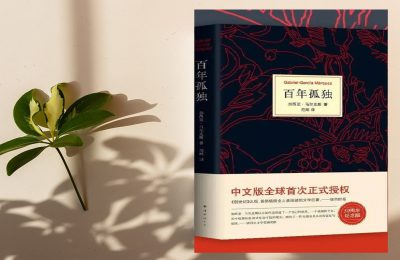《百年孤独》,是哥伦比亚作家加西亚·马尔克斯创作的长篇小说,是其代表作,也是拉丁美洲魔幻现实主义文学的代表作,被誉为“再现拉丁美洲历史社会图景的鸿篇巨著”。故事讲述马孔多小镇和布恩地亚家族的兴衰变化与传奇故事,记录了家族命运与百年历史,是重复地叙述相同而荒唐的命运,是拉美国家几百年命运的缩影,独具意味地隐喻着人类“文明”史的建立、发展与终结,在荒凉失落与荒唐可笑中诠释宿命式的轮回。家族中人物名字是相同或相近的,预示着他们拥有殊途同归的孤独命运。《百年孤独》以布恩地亚被捆在树上为开端,以他被蚂蚁吃掉为结束,通过细腻丰富的笔触、大胆自由的想象、魔幻的叙事艺术,讲述布恩地亚家族命运与历史,刻画人物孤独的灵魂与自我救赎,进而体现出个人、家族及全人类的悲悯与孤独情怀,让人们重新思考时代发展与人性变化。《百年孤独》被世界文坛誉为魔幻现实主义文学的主峰,已被翻译成30多种文字出版,销量逾1000万册。
Chapter 12
DAZZLED BY SO MANY and such marvelous inventions, the people of Macondo did not know where their amazement began. They stayed up all night looking at the pale electric bulbs fed by the plant that Aureliano Triste had brought back when the train made its second trip, and it took time and effort for them to grow accustomed to its obsessive toom-toom. They be. came indignant over the living images that the prosperous merchant Bruno Crespi projected in the theater with the lion-head ticket windows, for the character who had died and was buried in one film and for whose misfortune tears of affliction had been shed would reappear alive and transformed into an Arab in the next one. The audience, who paid two cents apiece to share the difficulties of the actors, would not tolerate that outlandish fraud and they broke up the seats. The mayor, at the urging of Bruno Crespi, explained in a proclamation that the cinema was a machine of illusions that did not merit the emotional outbursts of the audience. With that discouraging explanation many felt that they had been the victims of some new and showy gypsy business and they decided not to return to the movies, considering that they already had too many troubles of their own to weep over the acted-out misfortunes of imaginary beings. Something similar happened with the cylinder phonographs that the merry matrons from France brought with them as a substitute for the antiquated hand organs and that for a time had serious effects on the livelihood of the band of musicians. At first curiosity increased the clientele on the forbidden street and there was even word of respectable ladies who disguised themselves as workers in order to observe the novelty of the phonograph from first hand, but from so much and such close observation they soon reached the conclusion that it was not an enchanted mill as everyone had thought and as the matrons had said, but a mechanical trick that could not be compared with something so moving, so human, and so full of everyday truth as a band of musicians. It was such a serious disappointment that when phonographs became so popular that there was one in every house they were not considered objects for amusement for adults but as something good for children to take apart. On the other hand, when someone from the town had the opportunity to test the crude reality of the telephone installed in the railroad station, which was thought to be a rudimentary version of the phonograph because of its crank, even the most incredulous were upset. It was as if God had decided to put to the test every capacity for surprise and was keeping the inhabitants of Macondo in a permanent alternation between excitement and disappointment, doubt and revelation, to such an extreme that no one knew for certain where the limits of reality lay. It was an intricate stew of truths and mirages that convulsed the ghost of Jos?Arcadio Buendía under the chestnut tree with impatience and made him wander all through the house even in broad daylight. Ever since the railroad had been officially inaugurated and had begun to arrive with regularity on Wednesdays at eleven o’clock and the primitive wooden station with a desk, a telephone, and a ticket window had been built, on the streets of Macondo men and women were seen who had adopted everyday and normal customs and manners but who really looked like people out of a circus. In a town that had chafed under the tricks of the gypsies there was no future for those ambulatory acrobats of commerce who with equal effrontery offered a whistling kettle and a daily regime that would assure the salvation of the soul on the seventh day; but from those who let themselves be convinced out of fatigue and the ones who were always unwary, they reaped stupendous benefits. Among those theatrical creatures, wearing riding breeches and leggings, a pith helmet and steel-rimmed glasses, with topaz eyes and the skin of a thin rooster, there arrived in Macondo on one of so many Wednesdays the chubby and smiling Mr. Herbert, who ate at the house.
-1.gif)




